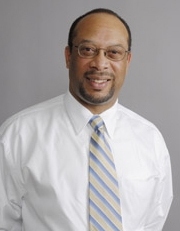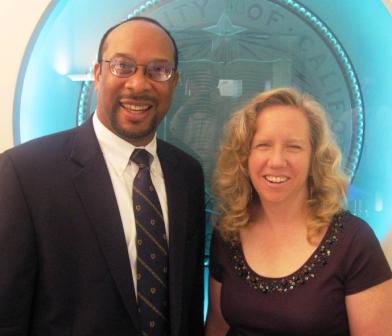November 2007

NOTES FROM THE ACADEMIC SENATE CHAIR
MICHAEL T. BROWN
Dear Colleagues,
Greetings! 2007-08 is shaping up to be another exciting, demanding, and productive year for the Academic Senate.
As you know, the University of California has been experiencing exceptionally challenging and turbulent times, especially with respect to the governance of the University and our budget position. I feel strongly that the Senate and shared governance can be, and must be, a stabilizing force for UC at this point in its history.
Over the coming year, the Academic Senate will be intimately involved in the selection of the next UC president. On September 17, at the request of The Regents, I appointed a 13-member Academic Advisory Committee, which includes one distinguished faculty representative from each division, Senate Vice Chair Mary Croughan, former Senate Chair Daniel Simmons as an at-large member, and myself. The Advisory Committee will work with The Regents’ Presidential Selection Committee to generate a confidential list of prospects, evaluate them against academic standards and other criteria, convert prospects to candidates (with the help of a search firm), interview them, and make recommendations to the Selection Committee.
I believe it is critically important for the future of the University of California that we choose a president who will command the respect and admiration of the University community, The Regents, and the public. The next UC president must be an “academic manager” in every sense of the term. He or she must be a highly distinguished scholar who has also demonstrated the ability to effectively manage a large, complex, public, research university. The next president must be a visionary and inspiring leader with the judgment, creativity, and courage to navigate the University through its current political and budgetary challenges, and to bring diverse constituencies together with one common purpose: to help this great institution achieve even greater heights for California, the nation, and the world.
The heart of UC can be found in our campus classrooms, laboratories, and training/service clinics. We need a president from an academic background who understands the challenges facing students and faculty at the ground level and who can provide administrative leadership to solve those challenges. The president must also be viewed by our constituencies outside the University as not simply a corporate leader concerned with the bottom line, but as a great academic leader – objective and analytical, deeply thoughtful and understanding, and committed to serving all of California’s diverse constituents. The new president must understand that the University is a source of hope for the people of California, who believe fervently that a UC education can enable anyone, regardless of means, station, or background, to make great contributions to their families and the society at large.
With regard to the budget, I believe it is critical for the Senate to take advantage of its advisory role in budget-setting to help re-vitalize UC’s academic infrastructure. The Senate should also support the efforts of the administration and The Regents to reinvigorate public investment in UC. Access and affordability are declining precipitously, and the twin specters of “corporatization” and “privatization” bring additional challenges that threaten the University’s excellence, governance autonomy, stability, and core mission.
The Academic Council cautiously shares President Dynes’ philosophy that UC should act as one University with ten campuses (“The Power of Ten”) to maximize the resources of the system and address big issues more effectively. It will be important to monitor any possible adverse effects of stratifying campus ambitions and quality. The Senate supports UCOP’s efforts to seek greater efficiencies in business and administrative systems and functions so that the University’s campuses, medical centers, and national labs can act in a unified and cost-effective way.
 |
Academic Senate Chair Michael Brown and Vice Chair Mary Croughan |
The Senate is also looking at ways to streamline our own operations and policy review practices. As former Academic Senate Chair Daniel Simmons noted in his paper, Shared Governance in the University of California: An Overview, the process of faculty evaluation can contribute to delays and inefficiencies. Shared governance is, indeed, a sometimes difficult and time-consuming process. Yet, it is part of a process that melds ten large and distinctive campuses into one University. That said, where the Senate can streamline operations, we should. We are currently developing a “triage” system for determining review priorities as well as a policy to help guide when “re-review” is necessary.
In September, I was pleased and gratified when The Regents followed President Dynes in endorsing the Senate’s Statement on Diversity, which asserts that diversity in education is a compelling interest for UC and the State of California. Given the Senate’s long-established commitment to both excellence and diversity, I look forward to receiving feedback from systemwide committees and divisions to a proposal from the Board of Admissions and Relations with Schools recommending changes to UC’s eligibility policy. Some of my other priorities this year include reducing the student-to-faculty ratio, increasing support for graduate students and graduate education, and strengthening the four-year plan to increase faculty salaries and restore the strength and relevance of the salary scale system.
As Senate chair, I look forward to working with you on solutions to the problems facing the University. I hope to find the wisdom to effectively translate the issues, needs, and perspectives of ten divisions into the policy perspectives of one Academic Senate and to represent faithfully those views to the faculty, administration, The Regents, and other constituencies. I believe the Academic Senate has a vital role in helping make the academic climate at UC optimal for world-class teaching, research, and service to the state, nation, and the world. The slate of challenges before the Academic Senate is formidable. But then, so are the faculty, students, staff, and friends of UC. I invite you to contact me at any time this year with your questions and ideas.
Fiat Lux,
Michael T. Brown
